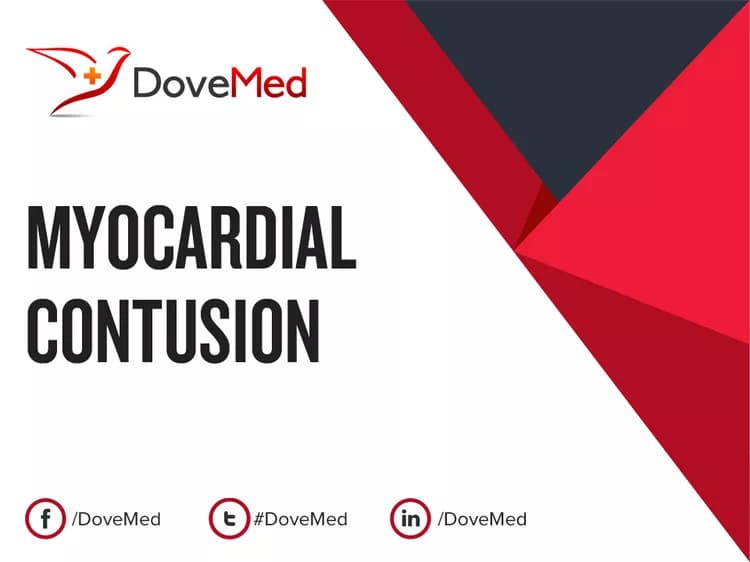
Myocardial Contusion
What are the other Names for this Condition? (Also known as/Synonyms)
- Blunt Myocardial Injury
- Traumatic Heart Disease
What is Myocardial Contusion? (Definition/Background Information)
- A Myocardial Contusion is a medical condition where the heart muscle becomes bruised. Usually, heart muscle bruising results from injury to the chest wall.
- While bruising of the heart muscle is not always injurious by itself, often time’s complications occur that can increase the risk of life-threatening conditions.
Who gets Myocardial Contusion? (Age and Sex Distribution)
- People of all ages and sexes are susceptible to getting a Myocardial Contusion.
- In most cases, adults in high-risk jobs where injury is likely develop myocardial contusions.
What are the Risk Factors for Myocardial Contusion? (Predisposing Factors)
Common risk factors of Myocardial Contusions include:
- Falling from great heights
- Motor vehicle accidents
- Auto-pedestrian accident injuries
- Working high-risk jobs where injuries can occur
- Having a history of heart problems such as arrhythmias
It is important to note that having a risk factor does not mean that one will get the condition. A risk factor increases one's chances of getting a condition compared to an individual without the risk factors. Some risk factors are more important than others.
Also, not having a risk factor does not mean that an individual will not get the condition. It is always important to discuss the effect of risk factors with your healthcare provider.
What are the Causes of Myocardial Contusion? (Etiology)
- Myocardial Contusions are caused by injuries to the heart muscle that result in bruising.
- Myocardial contusions can occur from penetrating, non-penetrating, or a combination of both types of chest injuries. Penetrating injuries occur when the chest cavity is pierced while non-penetrating injuries involve crush or compression injuries. In both cases, the heart muscle is negatively impacted and injured, and bruising occurs as it heals itself.
What are the Signs and Symptoms of Myocardial Contusion?
Common signs and symptoms of Myocardial Contusions include:
- Rib and sternum pain
- Light-headedness
- Nausea, Vomiting
- Racing heartbeat
- Shortness of breath, Feelings of weakness
- Signs and symptoms of a Heart attack
How is Myocardial Contusion Diagnosed?
To diagnose Myocardial Contusions, a physical exam will be conducted looking for the following signs:
- Chest wall bruises or scrapes
- Fast or irregular heartbeat
- Irregular breathing
- Chest pain/tenderness
- Crunching sensation when skin is touched
Often times, medical professionals also conduct a variety of laboratory tests, including:
- Blood tests to determine heart muscle damage.
- Chest X-ray to determine damage to the chest wall
- Electrocardiogram (ECG/EKG) to determine electrical activity of the heart
- Echocardiogram to determine the movement of the heart muscle movement abnormalities.
Many clinical conditions may have similar signs and symptoms. Your healthcare provider may perform additional tests to rule out other clinical conditions to arrive at a definitive diagnosis.
What are the possible Complications of Myocardial Contusion?
Complications commonly arise from the injuries that cause Myocardial Contusions to develop. Oftentimes, the injuries that people suffer can lead to further heart problems, which include:
- Arrhythmias
- Cardiac tamponade
- Congestive heart failure,
- Aneurysm
How is Myocardial Contusion Treated?
- Once a Myocardial Contusion has been identified and diagnosed, patients may be closely monitored in the hospital. To ensure that the heart is functioning properly, frequent electrocardiographic studies (ECGs) will be conducted.
- Medicines may be prescribed to relieve chest pain, heart rate abnormalities, or low blood pressure that can arise from Myocardial Contusions.
- In rare cases, placing a tube in the chest, draining blood from around the heart, or conducting surgery to repair any damaged blood vessels that are in the chest can treat Myocardial Contusions.
How can Myocardial Contusion be Prevented?
- Injuries and accidents that cause Myocardial Contusions are often difficult to prevent. It is important to take precautionary measures to decrease the likelihood that injuries occur.
- Wearing a seatbelt during vehicle rides, wearing safety equipment when doing risky activities, and taking care when under the influence of alcohol and drugs will all decrease the chance that injury occurs.
What is the Prognosis of Myocardial Contusion? (Outcomes/Resolutions)
- In most cases of Myocardial Contusions, a complete recovery is possible.
- If the injury is severe, serious heart problems can continue to exist after recovery. With proper care, these problems can be maintained and individuals can live relatively normal lives.
Additional and Relevant Useful Information for Myocardial Contusion:
The following DoveMed website link is a useful resource for additional information:
Related Articles
Test Your Knowledge
Asked by users
Related Centers
Related Specialties
Related Physicians
Related Procedures
Related Resources
Join DoveHubs
and connect with fellow professionals

0 Comments
Please log in to post a comment.